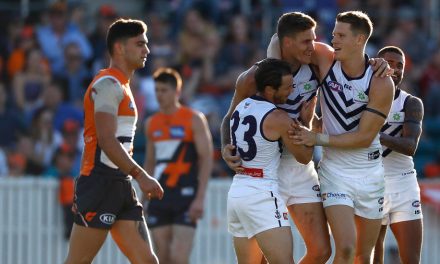Ashley Browne’s eye-opening book chronicles the unprecedented 2020 AFL season. Image: HARDIE GRANT
IT might be a digital world where laptops have silenced the heavy tapping on typewriters. The sound of a Bic pen scratching paper with shorthand scribble in a notebook is just a memory – and it might fade quicker than a voice recording on mobile telephones.
But, to the delight of traditionalists who still like the feel of ink on their fingers, in 2021 there is still the heavy clunk of metal on paper while a book works from the printing presses to the binding machines …
And far from gone is the pleasure of holding a beautiful collection of carefully selected words and pictures knowing the page will not disappear while the data reloads on a small screen. Or the iPad shuts down with a loss of battery power.
If Latin can survive to the 21st century, why can’t printed books? More so when Australian football is catching up with other sports, in particular cricket, in filling bookshelves.
With the Easter long weekend offering that chance to go into a voluntary “lockdown” away from the world, there is the chance to walk into the local bookstore or – as it is the digital age – let your fingers do the shopping on the Internet to nourish the mind.
THE BOY FROM BIRDUM
Bill Dempsey
Released on April 1 by Magabala Books ($29.99)
IT was the cover as it went around the conveyor belt that immediately stood out. A black-and-white photograph of a graceful footballer looking for his next move after dodging an opponent who is falling to ground after missing with the desperate tackle.
Bill Dempsey must have been fast. The way the scuffed turf is captured in the photograph gives testament to a player who must have been sharp on his feet – and with his mind.
Bill Dempsey was born at Birdum in the Northern Territory on March 17, 1942. At the end of 1976, the “Boy from Birdum” had a football resume that earns Hall of Fame status – 343 WAFL league games with West Perth, where he was club champion in 1966 and a premiership player in 1969 (best-afield with the Simpson Medal), 1971 and 1975, and 14 State games with Western Australia. He claimed a back pocket in the Indigenous Team of the Century. And the roll call of honours at the Darwin Football Club would fill a book.
As destiny would have it, a page from chapter 19 was taken off the line amid quality control checking and begged to be read as it sat in the recycling bin. At the time, Collingwood was in the news cycle after the awkward release of its long-awaited report on systemic racism at the AFL club.
Chapter 19, page 104, begins with Dempsey recalling how the “handful of Aboriginal players … used to cop it”. On the field and from the terraces, says Dempsey, and, most likely, on the streets in 1960s Australia.
“It was bad and it was constant,” Dempsey writes of racism in Australian football at that time. “Every game. At one level, it never used to bother me.”
Dempsey had been told by his mentor, “It’s the people having a go at you that have got a problem, not you.”
Dempsey described the racism he endured on and off the field during football matches as coming from people with “venom”. He would have opponents say, “Dirty black bastard. Don’t stand next to me, you stink.” His response was: “Just move in closer”.
Steve Hawke, son of former Prime Minister Bob Hawke, ensured the long-planned (and then COVID-delayed) book became a reality.
Famed broadcaster – and former West Perth player and coach Dennis Cometti – notes “some books demand to be written and read”. He puts Dempsey’s story in this category because “Bill Dempsey writes about matters of consequence”.
Dempsey wanted the book to be a record for “my kids and their kids” with his recollections of being a member of the Stolen Generations and a champion footballer – and an entrepreneur during the 1980s.
The story, as Cometti says, deserves a bigger audience.
AFL 2020 – A Season Like No Other
Ashley Browne
Hardie Grant Publishing ($32.99)
ONE day, more so if the AFL grand final becomes landlocked to the MCG for the next 25 years, someone will look at the record of AFL Season 2020 and take the grand final being at the Gabba in Brisbane as a misprint.
The fact there is no asterisk to denote the season was cancelled by the COVID pandemic is a story in itself. In fact, it is a book – a 237-page record of how, as AFL chief executive Gillon McLachlan promised, the game would find a way to continue and finish a premiership season.
Ashley Browne leaves an account, particularly for future generations, of how the AFL “did not yield to the nay-sayers” who wanted the football season to be packed away and carry an asterisk.
There are vital recollections from the game’s major players, starting with AFL Commission chairman Richard Goyder raising the first alarm about how the COVID pandemic could wreck the professional league – to the critical reflections of major figures such as Sydney premiership coach John Longmire noting: “The best thing about football (in 2020) is that is happened.”
It did … and it is worth recalling the way the sport and its key figures needed to adapt and now need to recover while the league works with less money and fewer people.
“Indeed,” writes Browne, “as the post-grand final buzz faded away, the AFL industry started to count the cost of a year with fewer matches, many without crowds and far less activity in and around the game.
PLEASE HELP US CONTINUE TO THRIVE BY BECOMING AN OFFICIAL FOOTYOLOGY PATRON. JUST CLICK THIS LINK.
“And it wasn’t a pretty picture. According to figures provided by the AFL, football suffered a reduction in industry revenue of around $600 million; the cash reserves the AFL and the clubs had painstakingly compiled over many years had been largely wiped out.”
Season 2021 is not quite the “old normal”. But the game goes on after enduring its greatest crisis since being challenged a century earlier to shut down during World War I and the pandemic that followed with Spanish flu.
The lessons in crisis management from 2020 are destined to serve Australian football well during its determination to be clear of the financial damage from COVID, at least at headquarters, within four to five years. At the Adelaide Football Club, new chairman John Olsen is even more ambitious with an 18-month recovery plan.
Learning how the AFL survived in 2020 through Ashley Browne’s account tells why the game is today in the hands of men and women confident they can have the code and their clubs thrive beyond COVID.
PORT ADELAIDE TO SHANGHAI – Taking Australia’s game to the world
Andrew Hunter
Wakefield Press ($29.95)
FIVE years ago, Port Adelaide president David Koch stepped into a crumbling 1930s stadium in Shanghai and onto a potted field used as a golf driving range and for community soccer games. He needed all of his fervent imagination to fire up to see how his AFL club could turn Jiangwan Stadium into an arena for the first AFL premiership-season match played in China.
His football club did it.
As with AFL 2020, someone needed to tell the story of how a gamble so far from home paid off for the Port Adelaide Football Club. Keith Thomas, the club’s chief executive during the China adventure, describes it as an “epic journey” and “one of Port Adelaide’s boldest achievements”.
Port Adelaide to Shanghai is “the fascinating inside story of that epic journey”.
It is written by Andrew Hunter, a former international volleyball player who had made his name as a political adviser and expert on China before he was hired as Port Adelaide’s China engagement executive.
Port Adelaide’s playing agenda in China is on “pause” (as the club puts it) while uncertainty is created by the COVID pandemic. The legacy of the “China Strategy” today is the much-needed financial power the once cash-strapped Port Adelaide Football Club needed while it struggled to tantalise corporate Australia in the sponsorship market.
Hunter puts his focus on this point in the final chapter of the book where many would expect some declaration on how Port Adelaide continues to kick a Sherrin on that carefully refitted field at Jiangwan Stadium.
Hunter writes of his passion for a football club and another world in China. These accounts of how far people prepared to extend themselves for a game, a club and a community become inspiring.
And for all the sacrifices this requires, Hunter closes his book saying his commitment was “born of deep desire to contribute something special to the enviable tradition of the Port Adelaide Football Club, an institution I feel incredibly privileged to have served.”
THE DEATH OF FITZROY FOOTBALL CLUB
Russell Holmesby
Hardie Grant Publishing ($34.99)
THIS year marks the 25th “anniversary” of the Fitzroy Football Club playing its last standalone season in the VFL/AFL competition to which it was a founding member in 1897.
Russell Holmesby, one of the most dedicated writers in Australian football, asks in the introduction to this book: “What is it like to lose your footy club? The short answer is that you can’t get close to understanding such a loss unless you have been through it.”
This is the “story of Fitzroy’s demise in the words of the men and women who lost their club.”
Many living in Australia’s regional zones would know the torment of not just clubs being lost, but also leagues.
Holmesby notes “the cynics will say that Fitzroy’s fate was inevitable, but it can equally be argued that the club was corralled and forced down a path engineered by the AFL.”
Fitzroy became part of a new Brisbane. There is the challenge to respect two heritages – the Lions of Fitzroy and the Bears of Brisbane – while building a new era as the Brisbane Lions.
Thankfully, someone (a St Kilda man who knows just how fragile a club’s immediate future can be), has ensured the spirit of a pioneer VFL club is recorded … and the pain of the old Fitzroy is noted by those who take their club’s presence in the AFL for granted.
Even after 25 years the mourning goes on among traditional Fitzroy fans. Many are lost to Australian football. This proves the point – fans barrack for a club, not the game nor a league.
The financial pressure on all football clubs and other sporting entities seeking to survive (more so than thrive) through the COVID pandemic makes this story from 25 years ago even more relevant to all football fans.
Happy Easter. Happy reading.












